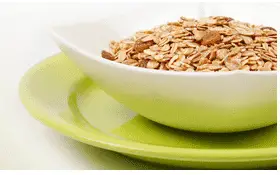Dietary Fiber (according to the medical dictionary) is a “nutrient in the diet that is not digested by gastrointestinal enzymes”. Even though fibers fall withing the carbohydrates category, it does not provide the same amount of calories, and it it is not processed in same way. Soluble fibers bind to water and keep the water within the intestine; insoluble fiber increase the stool bulk and movement of material through the digestive tract. For this reason, it is commonly referred to as roughage. Fiber is an essential nutrient in everyone’s diet. So. it is time we take fiber seriously. Here are 8 facts about fiber and the benefits of eating dietary fiber.
8 Facts about Dietary Fiber
1. Fiber fights diseases.
A diet high in fiber can help to prevent colon cancer, heart disease and diabetes. Fiber reduces cholesterol in the intestines. A high fiber diet also helps keep the blood stable. It also reduces blood sugar and insulin and prevent long term complications. Fiber can be used to treat constipation and other bowel disorders.
2. Fiber can actually control weight.
Studies show that overweight men and women who increased their intake of fiber had a better chance to lose weight. One explanation for this is that fiber slows the movement of food in the intestines. as a result the feelings of hunger is reduced and overall food intake is reduced. Also, fewer calories are taken, more is excreted, and weight loss will occur.
3. Most foods high in fiber are also dense in other nutrients.
Fruits, vegetables, and whole grains are all high in fiber and rich in vitamins and minerals. Some high fiber foods are: barley, oatmeal, oat bran, apple, banana, orange, grapefruit, peach, pear, plums, prunes, lentils, pinto beans and avocado.
4. Generally, legumes offer the most fiber.
Cooked legumes offer between 6.5 g to 10 g of total fiber in just 1/2 cup serving.
5. Fiber needs more water.
Fiber works with water. If you consume high amounts of fiber without fluid you can aggravate your constipation. Water helps move the fiber down. through your digestive tract. generally,you will need eight or more glasses of water every day on a high fiber diet.
6. Children can benefit from fiber in their diet.
Children require less than adults. The American Dietetic Association (ADA) suggest “the child’s age plus five” will equal the amount of grams of dietary fiber a child (between the ages of 3 to 18) should eat daily.
7. You can get enough dietary fiber.
An adequate intake of fiber per day would range from 21 g to 38 g. It is important to note that more is not always better. So pay attention to your bowel movements and speak with your physician if you have any questions. It is unlikely to eat too much fiber. But as a side note, excess fiber in the diet can interfere with the body’s absorption of minerals.
8. It is best to increase your daily intake of dietary fiber slowly.
Increasing too quickly can cause excess gas and bloating, and even diarrhea. You do not have to get all the fiber from one meal. It can come from several sources. Increase your fiber by doing the following: add a legume to your soup, add flax seed to cereals and desserts; have for a snack cut-up vegetables; and include fruits in between meals.
Natural is always better, but if you must, fiber supplements may also be helpful. Some people suffer from digestive disorders, irritable bowel or chronic constipation and fiber supplements may be very helpful to them. Fiber supplements makes the stool soft and can ease constipation, However, it must be taken with plenty of water. It is also necessary to consult with a physician before taking fiber supplements.
Note: Dietary Fiber supplements may interfere with the absorption of certain medications such as aspirin.
You might also like:
Healthy eating: taking control of what you eat
Healthy food choices
Introducing healthy eating
Tips for healthy eating
External Links:
Fiber
Fiber supplements
Download our free toolbar
Join our Facebook fanpage
Subscribe to our Newsletter

